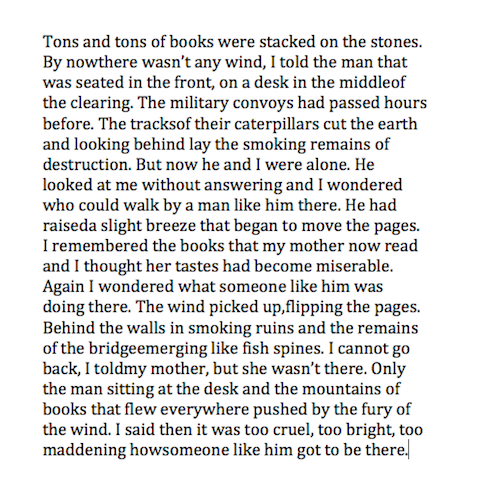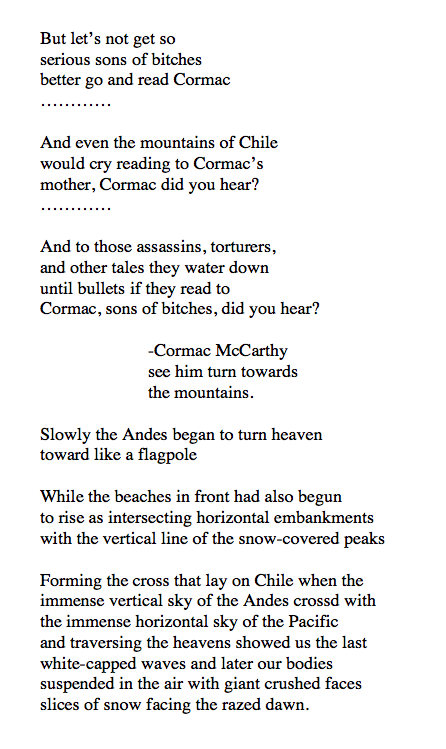Zurita and Cormac: The Story of Our American, Sentimental Education
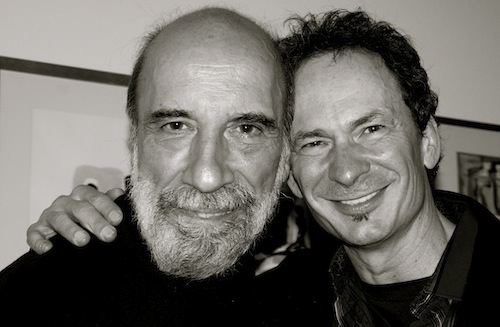
Now as I’ve started writing there is a persistent light rain falling, known as the chipi-chipi, under the stone arches and on the black slab and large avocado from a Mexican garden, sitting on the inside of the Hacienda de Santa Maria, where I live, here with my daughter, two dogs, a turtle and four rabbits. While I check old emails (the beautiful past and its ongoing verbal flow of correspondence that sustained my days) I notice that the bells are starting to ring. The day honoring the patron saint of the town where I live is coming. He is part saint and part angel and is drawn with wings outstretched, dressed as a soldier pressing his arm on the demon’s neck. I lived here when I met Zurita, and one day he came to visit me with his wife, Paulina (the P of his poems, the PW of his dedications) and we ate at a restaurant decorated with posters of the Taurine party. One day I will count how many bulls are on these walls. Thousands, like the stars of a poem by Zurita that surrounded our conversation, and by extension, Latin America. I remember Zurita telling me a love story of how his best friend fell in love with the mother of another mutual friend, and Jack Smith (the translator of Zurita's Anteparadise) fell in love with a woman, left literature for her and moved to Patagonia never to be seen again. Now that I’m opening the emails that actually prompted my talking about Zurita’s Night Boatmen, I am struck by this particular email where he talks about Cormac McCarthy. "Cormac" is what Zurita calls him. This letter, like many others, like hundreds of them, revolves around something that he’s reading, that Paulina is reading too, that I read or will have read soon, and on this day in particular it was a book by a Latino friend feeling a “late paternal feeling” that disappointed him (that he didn’t mention) and later his fascination with Cormac’s novels:
Well the thing is that Paulina brought me a McCarthy book so I would recover from the disappointment of the other reading that I already told you about and and what drives me crazy, absolutely crazy, no, I tell myself it's sad: that country the USA, it would be already enough with its with its amazing cities, all of the power and money, but it also has an incredible nature, the most stunning scenery and also, and last but not least, the most powerful artists and writers, how can it be? I’m born and raised here, as they say, anti-American, but at the same time I can’t help but admire them, that country, my god. If those writers and artists asked for the world to be different, can you imagine? But no, they make them into millionaires and celebrities and at the same time they don’t take them into account. Nowhere do artists and writers have power, but nowhere in the world do they have less power than in the United States. (May 8, 2007, from Santiago, Chile)
This observation about poets’ lack of power amazes me a little bit. I remember the newspaper I bought this morning: “La Crónica.” And I remember that it made me happy to see that there was a poet on the front page (Emilio Pacheco declaring old age is something as individual as his eye color ) and another poet on page 23: Pablo Neruda, with his famous poncho and beret hugging a short man, with glasses, somewhere between gentle and strong, Salvador Allende. The big headline was about the investigation of Michael Townley, the ex-CIA agent who, according to the poet’s former driver, posed as a doctor and injected poison into Pablo Neruda, killing him. Today what Zurita said seems true, that in my strange country, full of colors and beheadings, surrealist par excellence (Bréton defined Mexico this way in his dictionary) at least there is a poet on the front page.
Attached to this email was a poem that blew me away with its beauty, but at that time I didn’t realize (being so obvious) who the man standing among the pile of books was, making a difference. Now it seems an inescapable reality. In the most poignant desire of summoning his presence, Zurita had called Cormac McCarthy to stand among stacks of books with no destiny.
Sky Below
As I said, I didn't realize what I believe now: that it was Cormac that was sitting... and that it was his presence (we know he lives outside the media and interviews) that in the poem was so bright. When I received this email, neither Zurita nor I had read The Road. We read for those months, together with Paulina, books like Everyman by Phillip Roth, collectively disappointed that it had been translated as Elegy. Why is understanding “Everyman” or “Each man” of the possible translation that which makes us devour his books? I once wrote this: something devastatingly human, something that a novel would leave in bare bones. Later I wrote a poem that acts like my little theory about poetry (because I am unable to write a real theory) and named it “First Movement,” and now I think it’s linked to those days, to the letters that were sent back and forth about those books...to the presence of this man, Cormac, at his desk, surrounded by books with no destiny:
First Movement
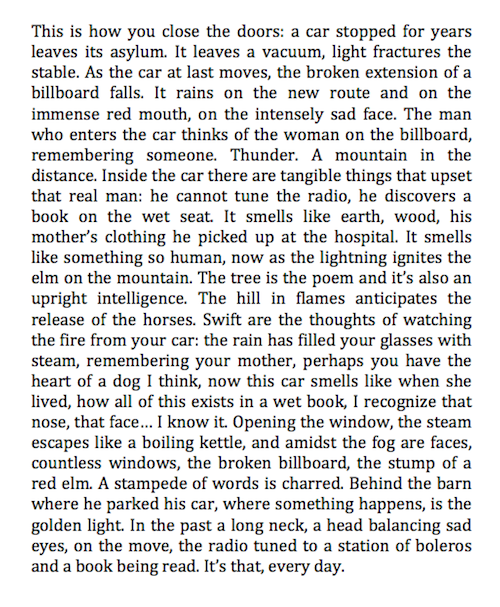
A novel encompasses what a poem should cover, which generates a territory that makes useless other books, other poems. We spoke of that while reading his novels, and Roth’s, and Ian McEwan's. But it's true that "Cormac" had a special place. I remember before going from Mexico to New York, living through a particularly awful moment that may have followed the tracks of my own misguided life, instead of looking at the clues I ended up reading The Road at dawn, as if this novel better encompassed my life, my own real life. The next morning this seemed to Zurita, in his own words, extremely logical. Zurita included in his Zurita a series of poems which challenges another poet to have the height that "Cormac" has:
Why Turn?
Now I’m looking for letters where there are references to his love for the novel and I find this letter where he answers my recommendation to read The Sea by John Banville, and Zurita writes that he found it in a bookstore in Santiago so I wouldn’t need to send him it anymore (and this is before he left for Istanbul). And now I'm surprised that this letter (and it will surprise those who read the blog about Zurita painting the whole sea with a drop of dye) included the text of the dream that was the origin of hundreds of poems. When he wrote this it only related to the name of the novel, and neither he nor I knew the consequence of that very dream in the book to come in his poetry. He talks about Banville's novel’s promising start, and the phenomenal book Patrimony by Roth. Actually you can see that his love for American literature exceeded its territory in England and Ireland, to the point that in some Zurita poems his father's funeral becomes Finnegan's Wake. This letter is dated January 30, 2007:
Dear Valerie,
I just bought The Sea, if everything that follows is like his first five lines I will actually believe that I bought the sea, I glanced at it in a cab and already it seems amazing. It will multiply me, Istanbul is waiting for me, and now I'm reading Roth's Patrimony and feel in every paragraph that I can not follow it, it's too much pain, it's a book about his father who is dying, it’s one of the most heartbreaking things I've read, god what a writer, and his strength is saying what any American might say, that anyone might think, and for that matter, his writing resonates in all its ferocity, in his ruthlessness. These thoughts resound in their simplicity but not a million Hegels together could refute it. They are final judgments, common, unappealable. It's really impressive in its pain, Valerie, a pain that makes me feel ashamed as a reader because I feel that I’m attending the spectacle of nudity so I think the writer is going to feel embarrassed later, like when someone makes one of those so very intimate confidences one senses that a second later you will feel ashamed of knowing it and then for avoiding it, and you immediately notice it’s even more intimate yet more naked and even more embarrassing. But it is a book and so I cannot confide in it so there is nothing else to do at that moment but to close the book and then open it timidly again to verify that the writer has not pulled back and the embarrassment continues.Dear Valerie, I had a dream last night that paralyzed me because I believe that it appeared so I would write a poem, a series of poems, and it terrifies me because I feel incapable of doing so, and because it has to do with the sea, it was a beach with ancient arched colonnades on the rocks and the sea was very rough. The breakers were wonderful, as I approached I saw that those breakers were in reality full of the dead, that they were breakers of the dead and their bodies were lengthening in the middle as the wave grew until it was just filaments and just before the crest of the wave broke, when the sun’s rays showed through the top, I saw that the filaments were thousands of colors: thousands of reds, yellows, violets, greens, and they curved until falling sweeping onto shore.
My dear friend, I send you a big hug, all the kisses to Oriana, I am on campus where I work and there is a lunch of “coexistence” before leaving for vacation, so I end this abruptly.
Another hug
Raul
Then I lived in New York and Zurita lived for a time in Boston and our adoration for American literature took on new proportions (we sent each other poems by Yusef Komunyakaa, C.D. Wright, and one crazy happy day he sent me a poem about a raven that left tracks of blood in the snow by Reginald Gibbons). I then sent him the poems called "Ligatures" by Forrest Gander (I was translating and painting their images) and was invited by Zurita to get this colection of poems published in Chile (and they did in Editorial Ventana Abierta) because according to Zurita "I want readers in my country to know how a poet can with a single line show a being ravaged by the forces of fate" This appeared later in Gander's novel As a Friend, a novel whose backbone is a poem, and we found us both confessing to having read it more than once, first in the English version, and later Zurita wrote to me from Madrid, Zurita, happy to have stumbled across the novel that upholstered the first shelf of a bookstore and to have bought and had it signed by someone who is a friend, but finally confessing that after opening it to have it signed by Forrest, he ended up reading it again like it had happened before, and we both sent each other this paragraph of the book that we admired, like signpost in the road:
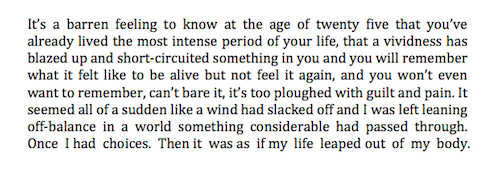
I'm back in my country now, I’ve returned back to that first moment with the bells continuing to ring in anticipation of the feast of St. Michael and I look at the walls covered in stacked novels that were neither practical nor cheap to take back and forth with me. It was so Latin American to do something like this, worshiping these books, rereading ad infinitum these letters containing my sentimental education made purely from American novels, and at the same time fearing the colossus of the north, which can produce these novels as well as a CIA agent disguised as a doctor who possibly lethally injected Neruda and in a few months wiped off Salvadore Allende, Chile's struggle for liberty and autonomy, and end the life of the poet that inspired a country to change itself (there where poets have influence on wider matters), and leave Zurita immersed in the chance of recovering or not from being imprisoned and tortured.
Prose and poetry translated from the Spanish by Torin Jensen
Painter and poet Valerie Mejer was born in Mexico City. Her poems explore containment and fragility,...
Read Full Biography


